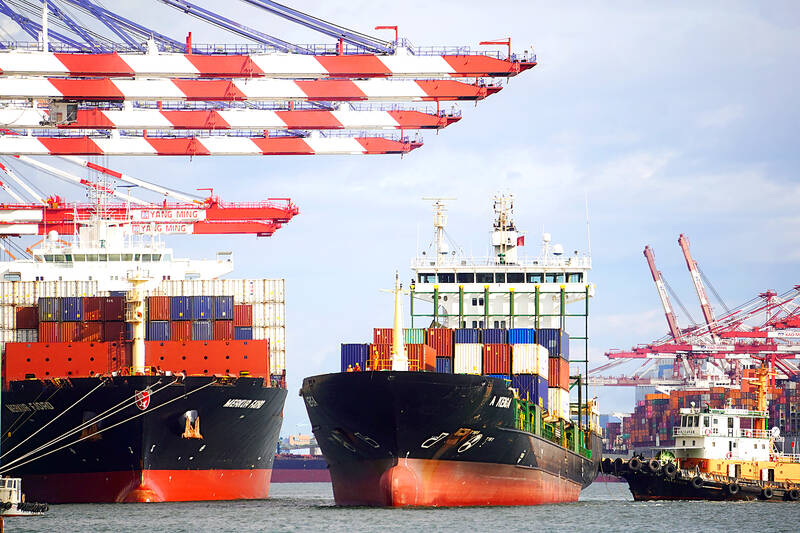Exports last month grew 4.4 percent from a year earlier to US$38.71 billion, thanks to strong demand from artificial intelligence (AI), which more than offset disruptions linked to the Lunar New Year holiday, the Ministry of Finance said yesterday.
The amount represented the second-highest for January and the 15th straight month of expansion, beating the ministry’s forecast of a 1.4 percent decline owing to fewer working days, Department of Statistics Director-General Beatrice Tsai (蔡美娜) said, adding that January is usually a slow season for tech sales.
For this month, the ministry expects exports to grow by 16 to 20 percent from a year earlier, bolstered by sustained AI demand and more working days, as this year’s Lunar New Year holiday fell mostly in January.

Photo: CNA
Exports for the first two months are forecast to increase by 9.7 percent to 11.5 percent, suggesting sturdy growth for Taiwan’s crucial economic gauge, Tsai said.
Exports of electronic components climbed 3.1 percent to US$13.99 billion, with chips contributing more than 90 percent, or US$13.04 billion, the ministry’s report showed.
Outbound shipments of information and communications technology products spiked 32.6 percent to US$12.5 billion, with hefty gains in sales of personal computers and peripheral devices, as well as routers, it said.
Inventec Corp (英業達), a supplier of AI servers and notebook computers, yesterday said its sales last month jumped 18.48 percent from a year earlier to a record-high NT$44.13 billion (US$1.35 billion).
Poor market demand and holiday disruptions weighed on sales of non-tech products, the ministry said.
Exports of base metal products shrank 1.6 percent, while exports of plastic and chemical products fell 12.3 percent and 18.7 percent respectively, it said.
Outbound shipments of minerals, transportation and textile products retreated 37.5 percent, 8 percent and 6.4 percent respectively, it added.
Exports to China including Hong Kong shed 11.7 percent, but rose 21.5 percent and 479 percent to Southeast Asia and Mexico respectively, as the two regions benefitted from ongoing global supply chain realignments, it said.
It remains to be seen if the relocations would help companies avoid US President Donald Trump’s threats of tariff hikes to address US trade imbalances with the rest of the world, Tsai said.
Imports slumped 17.2 percent to US$28.74 billion, as Taiwanese firms cut purchases of agricultural and industrial materials, as well as consumer products, but stepped up buying of semiconductor equipment by 41.9 percent, the ministry said.
That gave Taiwan a trade surplus of US$9.97 billion, up more than threefold from a year earlier.
Trump has said that Taiwan should increase its national defense budget and private investment in the US after “stealing” the US’ chip business.

Hon Hai Precision Industry Co (鴻海精密) yesterday said that its research institute has launched its first advanced artificial intelligence (AI) large language model (LLM) using traditional Chinese, with technology assistance from Nvidia Corp. Hon Hai, also known as Foxconn Technology Group (富士康科技集團), said the LLM, FoxBrain, is expected to improve its data analysis capabilities for smart manufacturing, and electric vehicle and smart city development. An LLM is a type of AI trained on vast amounts of text data and uses deep learning techniques, particularly neural networks, to process and generate language. They are essential for building and improving AI-powered servers. Nvidia provided assistance

GREAT SUCCESS: Republican Senator Todd Young expressed surprise at Trump’s comments and said he expects the administration to keep the program running US lawmakers who helped secure billions of dollars in subsidies for domestic semiconductor manufacturing rejected US President Donald Trump’s call to revoke the 2022 CHIPS and Science Act, signaling that any repeal effort in the US Congress would fall short. US Senate Minority Leader Chuck Schumer, who negotiated the law, on Wednesday said that Trump’s demand would fail, while a top Republican proponent, US Senator Todd Young, expressed surprise at the president’s comments and said he expects the administration to keep the program running. The CHIPS Act is “essential for America leading the world in tech, leading the world in AI [artificial

DOMESTIC SUPPLY: The probe comes as Donald Trump has called for the repeal of the US$52.7 billion CHIPS and Science Act, which the US Congress passed in 2022 The Office of the US Trade Representative is to hold a hearing tomorrow into older Chinese-made “legacy” semiconductors that could heap more US tariffs on chips from China that power everyday goods from cars to washing machines to telecoms equipment. The probe, which began during former US president Joe Biden’s tenure in December last year, aims to protect US and other semiconductor producers from China’s massive state-driven buildup of domestic chip supply. A 50 percent US tariff on Chinese semiconductors began on Jan. 1. Legacy chips use older manufacturing processes introduced more than a decade ago and are often far simpler than

Gasoline and diesel prices this week are to decrease NT$0.5 and NT$1 per liter respectively as international crude prices continued to fall last week, CPC Corp, Taiwan (CPC, 台灣中油) and Formosa Petrochemical Corp (台塑石化) said yesterday. Effective today, gasoline prices at CPC and Formosa stations are to decrease to NT$29.2, NT$30.7 and NT$32.7 per liter for 92, 95 and 98-octane unleaded gasoline respectively, while premium diesel is to cost NT$27.9 per liter at CPC stations and NT$27.7 at Formosa pumps, the companies said in separate statements. Global crude oil prices dropped last week after the eight OPEC+ members said they would